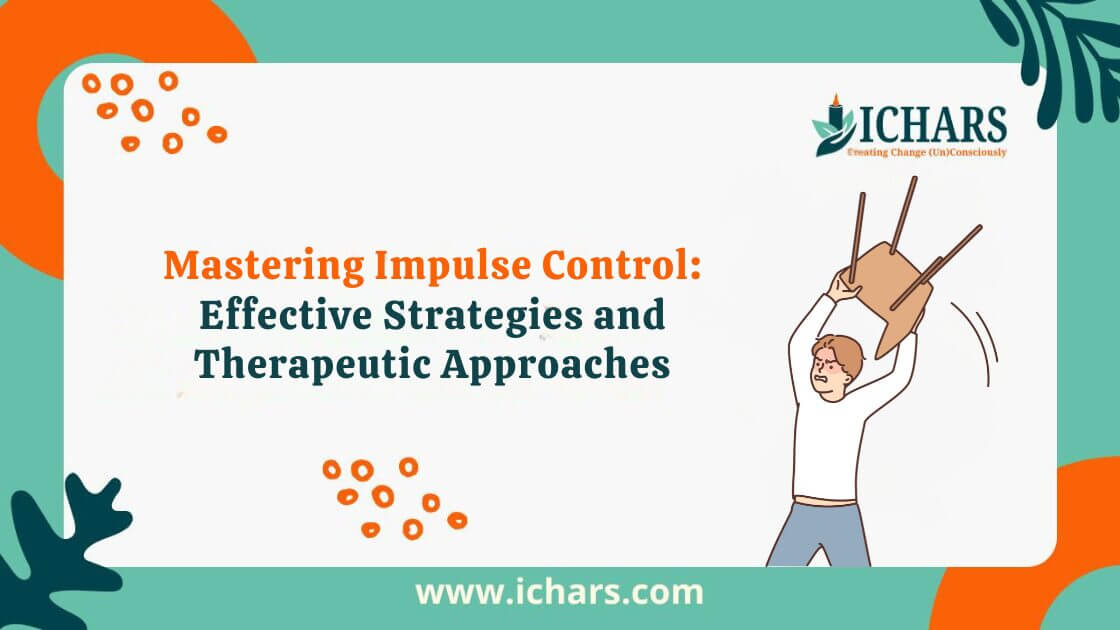Impulse control is a crucial aspect of human behaviour that allows us to regulate immediate desires, emotions, or actions in favor of long-term benefits. Whether it’s resisting the urge to splurge on unnecessary purchases or avoiding a heated argument, being able to control impulse helps maintain personal and professional relationships, mental health, and general well-being.
However, for many, inability to manage impulse can lead to detrimental outcomes such as addiction, financial ruin, or damaged relationships.
In this comprehensive guide, we’ll explore the nature of impulse management, factors that contribute to its dysfunction, and therapeutic approaches, including Cognitive Hypnotic Psychotherapy (CHP), to help individuals regain mastery over their impulses.
Understanding Impulse Control
Impulse management or control is the mental ability to resist immediate urges or temptations and make choices aligned with long-term goals. It involves brain regions such as the prefrontal cortex, responsible for decision-making, and the limbic system, which regulates emotions.
It is not just about avoiding negative behaviours but also about delaying gratification to achieve more significant, lasting rewards. For example, choosing to save money for a house rather than making impulsive purchases reflects strong impulse control.
Factors Contributing to Impulse Control Issues
Impulse control can be influenced by several factors, which vary from biological to environmental causes:
- Biological Factors: Genetics, brain chemistry imbalances, and neurodevelopmental disorders such as ADHD can impair an individual’s ability to regulate impulses.
- Environmental and Social Factors: Upbringing, exposure to stress, and societal norms can condition impulsive behaviours, especially in high-stress or emotionally triggering environments.
- Psychological Factors: Mental health conditions such as anxiety, depression, or trauma increase vulnerability to impulsive reactions as coping mechanisms.
- Situational Triggers: Specific stressors such as conflict, fatigue, or peer pressure can provoke impulsive responses in otherwise controlled individuals.
Understanding the underlying causes of impulse control issues is crucial for effective treatment and management.
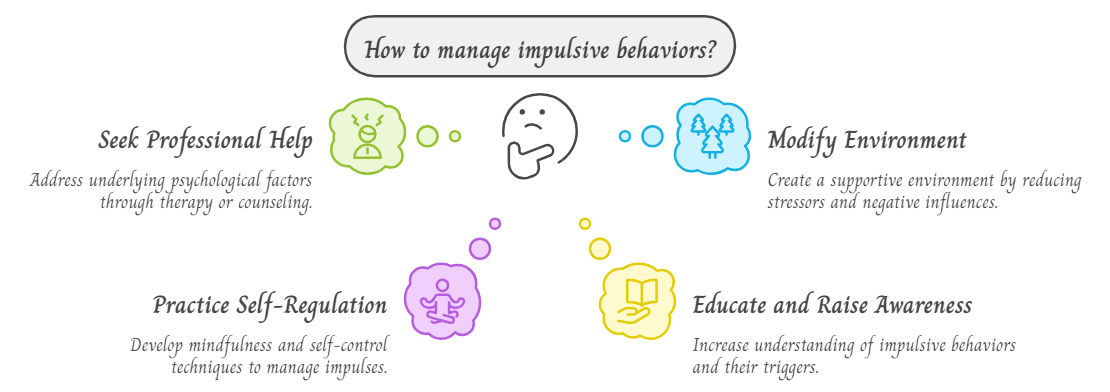
Signs and Symptoms of Impulse Control Issues
Recognizing impulse control problems is often the first step toward managing them. Some common signs include:
- Behavioural Symptoms: Reckless spending, binge eating, substance abuse, and aggressive outbursts.
- Cognitive Symptoms: Difficulty in delaying gratification, poor decision-making, and a tendency to act without considering the consequences.
- Emotional Symptoms: Sudden mood swings, emotional outbursts, or an inability to cope with stress in a healthy way.
Early identification of these symptoms can prevent more significant issues from developing, such as addiction, legal problems, or severe emotional distress.
Diagnostic Framework for Impulse Control Disorders
Diagnosing impulse control disorders requires a structured approach. According to the DSM-5 (Diagnostic and Statistical Manual of Mental Disorders), conditions such as Intermittent Explosive Disorder, Kleptomania, and Pyromania fall under impulse control disorders.
Diagnostic tools include:
- Clinical Interviews: In-depth conversations with clients to uncover underlying triggers.
- Standardized Tests: Tools like the Barratt Impulsiveness Scale (BIS) to measure impulsivity.
- Self-Report Measures: Helping individuals reflect on their own behaviour and emotions to identify patterns.
Additionally, it is important to distinguish impulse control disorders from other conditions such as OCD or mood disorders, which may present with similar symptoms.
Components for Improving Impulse Control
Addressing impulse control issues requires a multi-faceted approach, targeting emotional, cognitive, and behavioural aspects of the individual’s life.
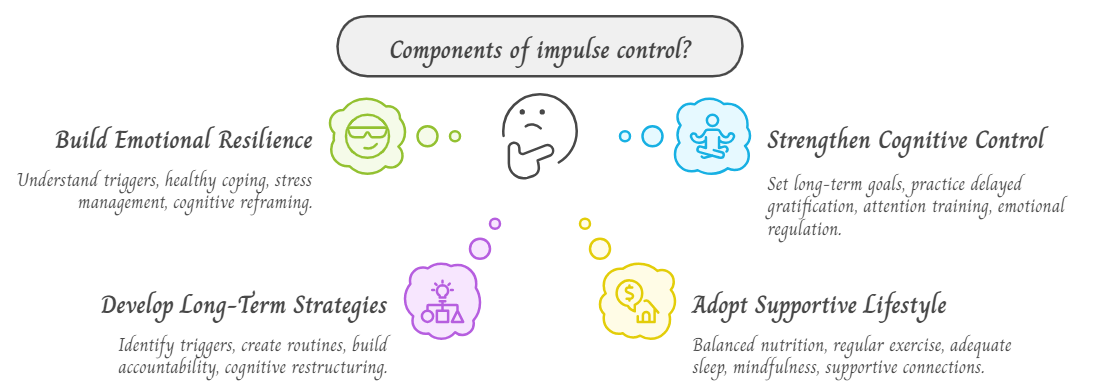
Building Emotional Resilience
Emotional resilience refers to the ability to adapt to stress and challenges while maintaining emotional equilibrium. It plays a crucial role in impulse control by helping individuals manage their reactions.
Key Elements:
- Understanding emotional triggers
- Engaging in healthy coping mechanisms
- Practicing stress management techniques
- Applying cognitive reframing to shift perceptions of challenging situations
Strengthening Cognitive Control and Decision-Making
Cognitive control is the capacity to regulate thoughts, focus attention, and manage actions in alignment with long-term goals. Strengthening cognitive control is vital for better decision-making and impulse management.
Key Elements:
- Establishing clear, long-term goals
- Practicing delayed gratification
- Engaging in attention training and problem-solving activities
- Enhancing emotional regulation skills
Developing Long-Term Strategies to Prevent Relapse
Preventing relapse in impulse control requires a proactive approach to maintain self-regulation and address potential triggers.
Key Elements:
- Identifying and managing triggers
- Creating supportive daily routines
- Building accountability through social support
- Engaging in cognitive restructuring and developing coping skills
Adopting a Supportive Lifestyle
Lifestyle choices greatly impact impulse control by influencing emotional and physical well-being. Adopting healthy habits can enhance self-regulation and improve mental clarity.
Key Elements:
- Maintaining balanced nutrition
- Engaging in regular physical exercise
- Ensuring adequate sleep
- Practicing mindfulness techniques
- Fostering supportive social connections
Common Strategies for Enhancing Impulse Control
While each of the four components above has unique elements, several strategies can be applied across all areas to improve impulse control effectively.
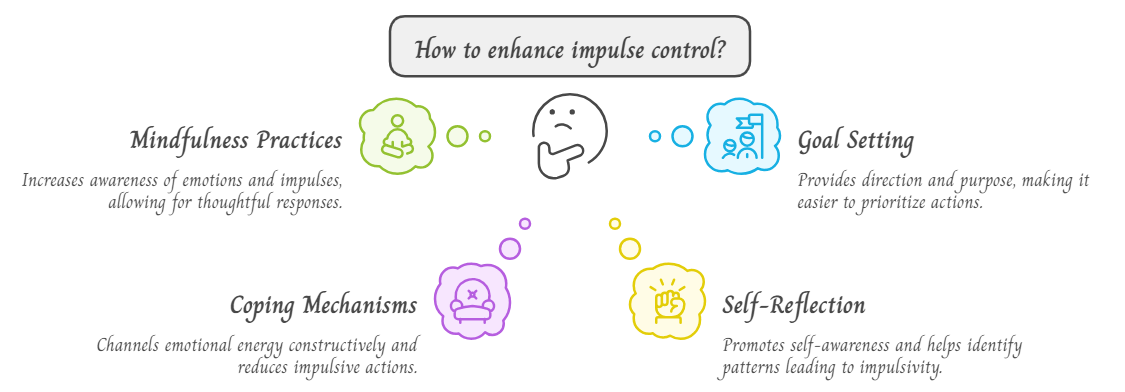
- Mindfulness Practices: Regular mindfulness exercises, such as meditation or yoga, increase awareness of emotions and impulses, allowing individuals to pause and respond thoughtfully rather than react impulsively.
- Goal Setting: Establishing specific, measurable goals provides direction and purpose, making it easier to prioritize actions and resist impulsive behaviours.
- Coping Mechanisms: Developing healthy coping strategies, such as journaling or engaging in hobbies, channels emotional energy constructively and reduces the likelihood of impulsive actions.
- Self-Reflection: Regularly reflecting on emotions, decisions, and triggers promotes self-awareness and helps individuals identify patterns that lead to impulsivity.
- Social Support: Building and maintaining a network of supportive relationships encourages accountability and provides a safety net during challenging times, making it easier to manage impulses.
Therapeutic Approaches for Helping Clients with Impulse Control Issues
Several therapeutic approaches are effective in helping clients regain control over impulsive behaviours.
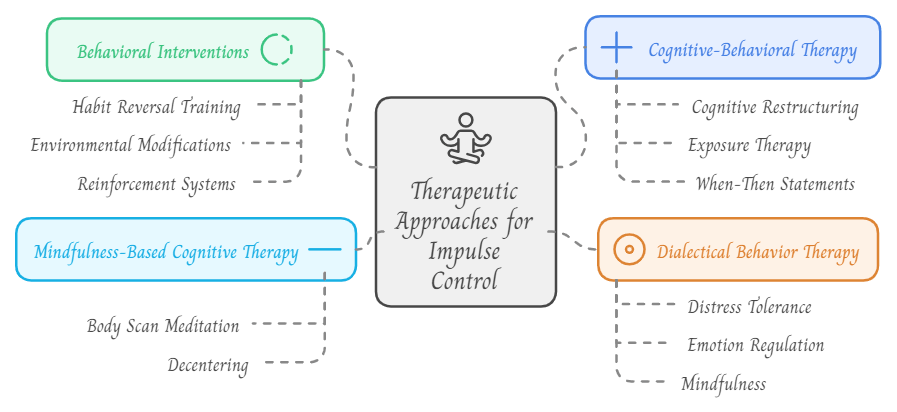
Behavioural Interventions
Behavioural interventions focus on modifying the specific actions that individuals take in response to their impulses. These strategies are practical and often yield quick results by teaching individuals how to replace impulsive behaviours with healthier alternatives.
Habit Reversal Training
This behavioural intervention identifies the early warning signs of an impulse and then teaches the individual to perform a competing response that is incompatible with the impulsive behaviour. For example, someone prone to nail-biting might learn to clench their fist when they feel the urge.
Environmental Modifications
By adjusting the environment to reduce exposure to triggers, individuals can limit their chances of acting impulsively. This could involve:
- Limiting access to tempting stimuli (e.g., disabling shopping apps for a compulsive shopper).
- Creating physical barriers (e.g., keeping unhealthy foods out of the house).
- Establishing strict routines that reduce decision-making under emotional stress.
Behavioural interventions also involve using positive reinforcement to encourage the desired behaviour. This could involve:
- Reward Systems: Providing a reward for resisting impulses or successfully managing triggers (such as a small treat after avoiding an impulsive behaviour).
- Behavioural Contracts: Creating a formal agreement between the client and therapist outlining specific rewards and consequences for meeting or not meeting impulse control goals.
Cognitive-Behavioural Therapy (CBT)
CBT is one of the most widely used approaches for treating impulse control issues. It focuses on changing the thought patterns and beliefs that lead to impulsive behaviours.
Key CBT Techniques for Impulse Control:
- Cognitive Restructuring: Helps clients challenge and change irrational beliefs that drive impulsivity, such as “I can’t resist this” or “I’ll feel better if I act on this now.
- Exposure Therapy: Gradual exposure to triggers (such as a shopping mall for a compulsive shopper) helps clients desensitize their emotional responses and practice new, healthier behaviours.
- When-Then Statements: Clients create conditional statements to rewire their thought processes, such as “When I feel the urge to overeat, then I will call a friend instead.”
Dialectical Behaviour Therapy (DBT)
DBT is particularly useful for individuals who struggle with intense emotions and impulsive behaviours. It teaches skills to help clients regulate their emotions, increase mindfulness, and tolerate distress.
Key DBT Techniques:
- Distress Tolerance: Clients learn to cope with emotional pain without resorting to impulsive actions, using techniques like distraction, self-soothing, and accepting reality as it is.
- Emotion Regulation: Helps clients identify, understand, and label their emotions, which reduces the impulsivity associated with emotional overwhelm.
- Mindfulness: By teaching clients to stay present in the moment, mindfulness reduces the likelihood of acting on impulsive urges.
Mindfulness-Based Cognitive Therapy (MBCT)
MBCT blends cognitive therapy with mindfulness practices, helping individuals become more aware of their impulsive urges and make deliberate choices instead of acting out of habit.
MBCT Techniques for Impulse Control:
- Body Scan Meditation: Encourages clients to observe physical sensations associated with impulsive urges, creating a mindful pause before reacting.
- Decentering: A mindfulness technique that helps clients view their thoughts as temporary mental events, rather than truths they must act upon.
Cognitive Hypnotic Psychotherapy (CHP)
Cognitive Hypnotic Psychotherapy (CHP) is an integrative therapeutic approach that seamlessly combines elements from Cognitive, Behavioural, Humanistic, and Psychodynamic therapies, along with techniques from Mindfulness, Neuro-Linguistic Programming (NLP), and hypnosis. CHP is especially effective in addressing impulse control issues because it works on multiple levels—conscious and subconscious—to bring about sustainable change.
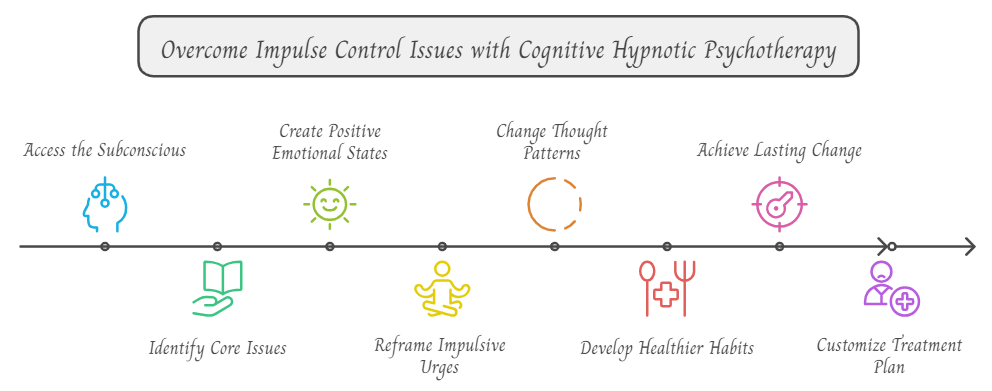
How CHP Helps with Impulse Control
- Hypnosis and Subconscious Work: Hypnosis allows individuals to access deeper levels of the mind, where unresolved emotional conflicts and triggers for impulsive behaviours often reside. By addressing these core issues, clients can experience more profound and lasting change.
- NLP Techniques: NLP-based strategies like Anchoring help clients create positive emotional states they can access in moments of temptation, such as calmness or confidence. NLP also facilitates Reframing—helping clients view their impulsive urges in a new light, making it easier to resist them.
- Cognitive and Behavioural Integration: CHP integrates traditional cognitive techniques like Cognitive Restructuring with behavioural tools, ensuring that the client not only changes their thought patterns but also develops healthier habits and responses to triggers.
Advantages of CHP for Impulse Control:
- Holistic Approach: By addressing both conscious thought patterns and deep-seated subconscious beliefs, CHP can help clients tackle impulse control issues from the root.
- Customized Treatment: CHP is flexible and can be adapted to each client’s unique needs, ensuring a personalized treatment plan that aligns with their goals and challenges.
- Mind-Body Integration: The use of hypnosis and NLP techniques helps clients align their mental and emotional states, increasing their ability to control their impulses in challenging situations.
Case Study: Using Cognitive Hypnotic Psychotherapy (CHP) for Impulse Control Issues
Client Profile:
Sarah, a 28-year-old woman, sought therapy for impulse control issues, including excessive shopping and occasional substance abuse during stressful times.
Assessment and Goal Setting:
Sarah’s initial assessment through Cognitive Hypnotic Psychotherapy revealed childhood emotional neglect as a core issue, which led her to use shopping and substances as coping mechanisms.
Therapeutic Intervention:
Using NLP anchoring techniques, Sarah learned to trigger feelings of calmness and confidence when faced with stress. Reframing helped her view her shopping urges as temporary emotional fixes, while the SWISH pattern (an NLP technique) helped replace these impulses with positive future outcomes.
Outcome:
After 12 sessions, Sarah experienced significant improvements. She reported reduced impulsive behaviours and felt more in control of her actions. The holistic approach of CHP allowed her to understand and transform her emotional triggers, leading to sustainable change.
Conclusion
Impulse control is essential for maintaining a balanced, fulfilling life. While challenges with impulsive behaviours can lead to significant personal and social consequences, understanding the factors contributing to impulse control issues and applying therapeutic strategies can help individuals regain control.
By integrating a wide range of techniques, from behavioural interventions to the holistic approach of Cognitive Hypnotic Psychotherapy, therapists can effectively help clients overcome impulsive behaviours, creating lasting positive change.
